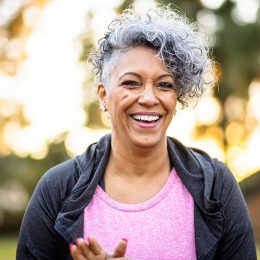Your Top 7 COVID-19 Vaccine Questions, Answered
When can you see your grandkids? Will you have to get a shot every year? Here, experts address your most pressing concerns.
 After a slow start, COVID-19 vaccinations across the country are finally picking up steam. There are now three vaccines available, and as of May 13, more than 70 percent of adults 65 years and older are fully vaccinated, according to the Centers for Disease Control and Prevention (CDC).
After a slow start, COVID-19 vaccinations across the country are finally picking up steam. There are now three vaccines available, and as of May 13, more than 70 percent of adults 65 years and older are fully vaccinated, according to the Centers for Disease Control and Prevention (CDC).
Whether you’re fully vaccinated or still trying to get a vaccine appointment, you probably have some questions about the shot. We spoke with some of the country’s top infectious disease and vaccine experts to get answers. Here’s what you should know.
Question #1: If I Already Had COVID-19, Do I Still Need to Get the Shot?
Yes. For one thing, though it’s not common, we’re starting to see people who already had COVID-19 getting it a second time, says David Hamer, M.D., a professor of global health and medicine at Boston University and an infectious disease specialist. Plus, he says, there’s evidence that “people who had a mild or asymptomatic infection may not have built up a very strong immunity.”
In addition, you have the new variants to consider. “Even if you do have natural immunity, it may not protect you from these new strains,” explains Maria Elena Bottazzi, Ph.D., an associate dean of the Baylor College of Medicine and an expert in vaccine development.
The bottom line: Even if you already had COVID-19, a vaccine will most likely give you the longest and best protection against it going forward. If you received treatment for COVID-19 previously, ask your doctor when you should schedule your vaccination.
Question #2: Will the Vaccine Protect Me from New Variants?
Viruses mutate, or change. This leads to variants, which may have different characteristics than the current virus. Some variants, for example, may spread more easily or may make people sicker.
Health experts are still gathering data on whether the current COVID-19 vaccines offer protection against new variants, but what they’ve seen so far is promising.
“Ideally, if you’re vaccinated and you get exposed to a variant, you’re still protected from severe disease, and that’s the indication we’re seeing right now,” Bottazzi says.
The good news is that vaccine makers are already at work on booster shots that will target variants, Dr. Hamer says.
Question #3: How Do These Vaccines Actually Work?
The short answer is all COVID-19 vaccines help your body’s immune system recognize and fight the coronavirus that causes the illness. None of them use the live virus that causes COVID-19, and none of them can give you COVID-19.
The details of how they work depend on the type of vaccine, but they share many of the same key steps.
Step 1: When you get the vaccine, your body starts to make something called “spike proteins.” They resemble the spikes that cover the outside of the virus that causes COVID-19. On their own, these spike proteins are harmless.
Step 2: Your immune system begins to recognize these spike proteins as invaders, which triggers the production of antibodies that fight the virus.
Step 3: After you are fully vaccinated, if you are exposed to the actual virus, your body will be able to recognize it and fight it with antibodies.
Question #4: How Long Does It Take for the Vaccine to Work?
It depends on the vaccine. You’re considered fully vaccinated:
- Pfizer: Two weeks after your second shot
- Moderna: Two weeks after your second shot
- Johnson & Johnson: Two weeks after your shot
Question #5: Can I Finally Go Visit My Grandchild?
If you’ve been fully vaccinated, yes! As of May 13, the CDC says that fully vaccinated people can resume activities that they did before the pandemic. So, you won’t need to wear a mask or stay physically distanced from others—unless there are rules or guidelines in specific settings that say otherwise.
For example, you will still need to wear a mask and follow any COVID-19 safety protocols when traveling by plane, train, or public transportation. And some health facilities, businesses, and workplaces may still have COVID-19 rules. This is because there may be more risk of COVID-19 spread in these settings, especially if people are close together in a small space.
Question #6: What If I Miss My Second Dose?
The Pfizer vaccine requires two shots given 21 days apart, and the Moderna vaccine requires two shots given 28 days apart.
Subscribe to our newsletter
It's quick and easy. You could be one of the 13 million people who are eligible.
Already a member? Click to discover our 15,000+ participating locations.
Follow Us
If you miss your second shot for some reason, the first thing to do is talk to your doctor as soon as possible, Bottazzi says. “Ideally, you’ll follow the schedule, because that’s what gives you the best protection. You may be at risk of still getting the disease if you don’t get your second dose in time.”
But it’s not hopeless. The CDC says you can still get your second dose if it’s been less than six weeks since you got your first. And if it’s been longer than that, your doctor can advise you how to get back on track with vaccination quickly. The sooner you can complete your vaccination, the better protected you’ll be.
Question #7: Will I Have to Get It Every Year Like the Flu Shot?
“The reason we need a flu shot every year is because the flu virus mutates frequently, and we need to boost our immunity against the influenza strains that are circulating that year,” explains Paul Biddinger, M.D., chief of emergency preparedness at Massachusetts General Hospital and chair of the Massachusetts COVID-19 vaccine advisory board. “Because we’ve seen several mutations to the coronavirus, it’s possible we’ll need boosters to adapt to future mutations that may occur,” he says.
But it’s too soon to know for sure. “It takes a while for a virus to establish itself,” Bottazzi says. “COVID-19 may end up being seasonal like the flu. It depends on how much the variants take over.”
We also don’t know how long immunity from these vaccines will last, Dr. Biddinger adds. If we learn that it only lasts for, say, a year, we’ll likely need to get booster shots.
For the latest on COVID-19 vaccines, see information from the CDC. And if you’re having trouble booking a vaccine appointment, check out these tips to make it happen.
Take Your Favorite SilverSneakers Classes Online!
SilverSneakers members can access live fitness classes and wellness workshops through SilverSneakers LIVE. See the latest schedule and RSVP for classes here.
Not a member? If you have a Medicare Plan, it may include SilverSneakers—at no additional cost. Check your eligibility instantly here.





